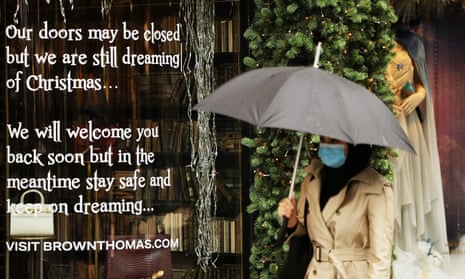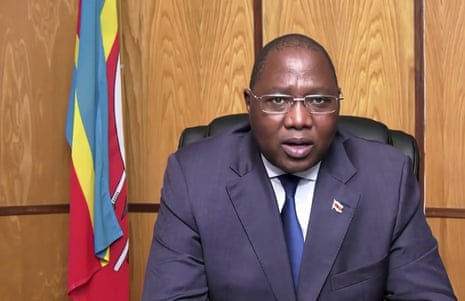We’ve launched a new blog at the link below – head there for the latest:
Turkey's Covid death toll hits record for ninth day – as it happened
This blog is now closed. We’ve launched a new blog at the link below:
Tue 1 Dec 2020 18.58 EST
First published on Mon 30 Nov 2020 18.58 EST- UK government wins vote on new tier restrictions for England
- Summary
- Belgian police arrest 25 men including MEP as 'sex party' breaks curfew
- Turkey's coronavirus death toll hits record for ninth consecutive day
- Austria set to bow to pressure on Covid risk with ski holiday ban
- Lastminute.com to pay £7m in refunds for cancelled holidays
- BioNTech/Pfizer and Moderna file for EU approval of Covid-19 vaccine
- Lewis Hamilton tests positive for Covid-19 and will miss F1 Sakhir GP
- Concerns in Ireland as shopping sprees follow Covid lockdown
- Summary
- Los Angeles shuts down Covid testing site to allow film shooting
- Jakarta governor and deputy test positive
- Three more Pakistan cricketers test positive for coronavirus
- Japan cancels Yamanashi contest after eight speed skaters get coronavirus
- WHO calls Mexico's rising coronavirus trend 'very worrisome'
- WHO says ‘will do everything’ to find Covid-19 origins
- Scott Atlas resigns as special adviser to Trump on coronavirus
- China gave Covid-19 vaccine candidate to Kim Jong Un
- UN tourism body urges uniformity in virus travel rules
- US may begin vaccinations before Christmas
- Samoa’s two positive Covid-19 cases have been declared historical cases and not infectious.
- Vietnam reports first community virus in almost three months
- Summary

Live feed
- UK government wins vote on new tier restrictions for England
- Summary
- Belgian police arrest 25 men including MEP as 'sex party' breaks curfew
- Turkey's coronavirus death toll hits record for ninth consecutive day
- Austria set to bow to pressure on Covid risk with ski holiday ban
- Lastminute.com to pay £7m in refunds for cancelled holidays
- BioNTech/Pfizer and Moderna file for EU approval of Covid-19 vaccine
- Lewis Hamilton tests positive for Covid-19 and will miss F1 Sakhir GP
- Concerns in Ireland as shopping sprees follow Covid lockdown
- Summary
- Los Angeles shuts down Covid testing site to allow film shooting
- Jakarta governor and deputy test positive
- Three more Pakistan cricketers test positive for coronavirus
- Japan cancels Yamanashi contest after eight speed skaters get coronavirus
- WHO calls Mexico's rising coronavirus trend 'very worrisome'
- WHO says ‘will do everything’ to find Covid-19 origins
- Scott Atlas resigns as special adviser to Trump on coronavirus
- China gave Covid-19 vaccine candidate to Kim Jong Un
- UN tourism body urges uniformity in virus travel rules
- US may begin vaccinations before Christmas
- Samoa’s two positive Covid-19 cases have been declared historical cases and not infectious.
- Vietnam reports first community virus in almost three months
- Summary
European countries were on Tuesday given a clear timeframe for the start of their vaccination programmes after the EU’s medicines regulator said it would decide by 29 December whether to grant emergency approval for the first Covid-19 jabs, AFP reports.
France plans to prioritise the most fragile and exposed groups in early 2021, followed by a second campaign for the rest of the population between April and June, the president Emmanuel Macron announced.
Germany has already said it is hoping to launch its immunisation drive in the first quarter of 2021 and is preparing vaccination centres across the country.
The European Medicines Agency (EMA) said it would hold an extraordinary meeting on 29 December “at the latest” to consider emergency approval for a vaccine developed by Germany’s BioNTech and US giant Pfizer.
Hopes that shots could be ready for use by the end of this year received a boost when US firm Moderna said it was filing Monday for emergency authorisation of its vaccine in the United States and Europe.
The EMA said it would hold a separate meeting to assess that request by 12 January at the latest.
Large-scale trial data released last month showed that both vaccines were safe and around 95 percent effective against Covid-19.
European Commission spokesman Stefan de Keersmaecker told reporters that once the EMA gave regulatory permission, formal authorisation from Brussels would follow “very quickly”, probably “in a matter of days”.
Brazil will give priority to the elderly, health workers and indigenous people for vaccination against Covid-19, the health ministry said on Tuesday, unveiling a four-stage preliminary plan for national immunisation. The ministry said in a statement that a final plan would depend on the vaccines that become available.
ESwatini’s prime minister Ambrose Dlamini, who tested positive for Covid-19 two weeks ago, has been transferred to a hospital in neighbouring South Africa for further treatment, the tiny absolute monarchy’s government said on Tuesday.
The country’s deputy prime minister, Themba Masuku, said in a statement Dlamini was moved to “guide and fast track his recovery”.
The southern African nation of around 1.2 million people has so far recorded 6,419 positive cases, with 122 confirmed deaths, according to the World Health Organization.

New Covid-19 infections in France stayed below 10,000 for the third day in a row on Tuesday, a sequence unseen since mid-September, and the number of people hospitalised resumed a downward trend.
The government has loosened its second national coronavirus lockdown, put in place on 30 October, by allowing all shops to reopen at the weekend.
The French president Emmanuel Macron said last week the lockdown could be lifted on 15 December if by then the number of new cases per day fell to 5,000 and the number of patients in intensive care declined to between 2,500 and 3,000.
Earlier in the day, Macron said that France should be in a position to embark on a broader Covid-19 vaccination campaign between April and June next year, after initially targeting a smaller group of people.
Health authorities reported 8,083 new cases over the past 24 hours on Tuesday, versus 4,005 on Monday and 9,784 on Sunday.
The seven-day moving average of daily new infections fell below 11,000 for the first time since 2 October, at 10,965, four times lower than the all-time high of 54,440 reached on 7 November.
The cumulative number of Covid-19 cases now totals 2,230,571, the fifth-highest in the world.
After increasing by 90 between Sunday and Monday, the number of people hospitalised for the disease fell by 619 to 27,639, below 28,000 for the first time since 4 November. The number of patients in ICUs declined by 146 to 3,605.
The number of people in France who have died from Covid-19 rose by 775 to 53,506, versus a rise of 406 on Monday. But the seven-day moving average of daily additional deaths stood at 467, below 500 for the first time in more than three weeks.
UK government wins vote on new tier restrictions for England
Prime minister Boris Johnson suffers biggest Commons revolt since election as MPs back new Covid tiers by 291 to 78. Follow on the UK blog
Summary
Here’s a quick recap of all the latest coronavirus developments across the globe from the last few hours:
- BioNTech/Pfizer and Moderna file for EU approval of Covid-19 vaccine. Germany’s BioNTech and its US partner, Pfizer, have applied for EU regulatory approval for their Covid-19 vaccine, raising hopes that the first jabs could be administered in December. If approved, the vaccine could potentially be rolled out “in Europe before the end of 2020”, the companies said in a statement. US biotech company Moderna said it had also sought regulatory approval for its Covid-19 shot in both the US and Europe.
- Belgian police arrest 25 men including MEP as ‘sex party’ breaks curfew. A Hungarian MEP in Viktor Orbán’s rightwing party, spotted fleeing along a gutter to escape police raiding a “sex party” above a Brussels bar, has apologised for breaching Belgium’s lockdown rules. József Szájer was one of about 20 people, mainly men and including at least two EU diplomats, who attended a party held near the Grand Place on Friday evening.
- Lewis Hamilton tests positive for Covid-19 and will miss F1 Sakhir GP. The driver is “devastated” to miss Sunday’s Sakhir Grand Prix after contracting coronavirus. Hamilton tested positive the day after winning the Bahrain GP and is in isolation. His participation in the final race of the season at Abu Dhabi remains in the balance.
- Lastminute.com to pay £7m in refunds for cancelled holidays. The flight and hotel booking site has agreed to pay £7m in refunds to more than 9,000 customers whose holidays were cancelled because of coronavirus. After an investigation by the Competition and Markets Authority, lastminute.com has given undertakings that it will pay refunds as soon as possible, and by 31 January at the latest.
- Turkey’s coronavirus death toll hits record for ninth consecutive day. Turkey’s daily Covid-19 death toll hit a record high for a ninth consecutive day on Tuesday, with 190 fatalities in the last 24 hours, as Turks braced for new restrictive measures to curb the spread of the pandemic.
- Concerns in Ireland as shopping sprees follow Covid lockdown. Ireland emerged from maximum Covid-19 restrictions on Tuesday, prompting pre-dawn shopping sprees and appeals to the public to stay vigilant against infection.
- Austria set to bow to pressure on Covid risk with ski holiday ban. Austria’s government appears to have bowed to pressure from Germany, France and Italy and will ban skiing holidays over the Christmas break in an attempt to control the coronavirus pandemic. The decision, expected to be officially announced on Wednesday, follows heated disagreements between Berlin and Vienna.
That’s all from me, Jessica Murray, my colleague Lucy Campbell will be taking over shortly.
Securing a coronavirus vaccine for all European countries will be a top priority for Portugal when it takes over the presidency of the EU next January, Portuguese prime minister António Costa has said.
“We must guarantee we have a vaccine available which is effective in stopping Covid and which permits us to reach on the same day all countries of Europe,” Costa said at a news conference with the European council president, Charles Michel.
US president-elect Joe Biden said any coronavirus relief legislation passed before he takes office in January is “just a start”.
Biden said his team is working on a relief package his administration will roll out after he takes office.

A longtime museum director dubbed the grande dame of the Russian art world has died at 98, prompting an outpouring of grief and admiration for the woman who brought the Mona Lisa to Moscow and returned masterpieces hidden for decades from the Soviet public to her museum’s exhibition halls.
Irina Antonova, whose work at the Pushkin Museum began under Joseph Stalin and ended under Vladimir Putin, died on Monday evening of complications from the coronavirus. Her death was confirmed by the press service of the museum, where she served as director for 52 years from 1961 to 2013.
Belgian police arrest 25 men including MEP as 'sex party' breaks curfew

A Hungarian MEP in Viktor Orbán’s rightwing party, spotted fleeing along a gutter to escape police raiding a “sex party” above a Brussels bar, has apologised for breaching Belgium’s lockdown rules.
József Szájer, a senior member of the Fidesz party who helped write Hungary’s constitution in 2011, was one of about 20 people, mainly men and including at least two EU diplomats, who attended a party held near the Grand Place in the Belgian capital’s historical centre on Friday evening.
The MEP had attempted to escape the scene by climbing out of a window from the first floor apartment before being spotted by a passerby “fleeing along the gutter”, according to Sarah Durant, a spokeswoman for the Brussels region’s deputy public prosecutor.
“The man’s hands were bloody,” Durant said. “It is possible that he may have been injured while fleeing. Narcotics were found in his backpack. The man was unable to produce any identity documents. He was escorted to his place of residence, where he identified himself as SJ (1961) by means of a diplomatic passport.” It was reported he tried to claim diplomatic immunity.
In a statement, Szájer, 59, who resigned on Sunday without mentioning his brush with the law, apologised for his “irresponsible” behaviour but denied carrying drugs.
France will take measures to stop skiers from sidestepping local virus restrictions and hitting the slopes in other countries during the Christmas holidays, the president, Emmanuel Macron, has said.
Downhill skiing is effectively banned in France for the season to help contain the spread of Covid-19 after the government said last week that ski lifts would remain closed until January, even though resorts could otherwise operate.
Slopes are open in neighbouring Switzerland, tempting French winter sports lovers to cross the border from 15 December, when the current partial lockdown is lifted.
“If there are countries that keep their resorts open, there will be controls to dissuade the French,” Macron told a news conference. This was to avoid “creating a situation in which there is an imbalance with stations in France”, he said.
Switzerland – not an EU member, though it has strong ties to the bloc – has ignored calls to fall into line, much to the frustration of French officials.
“In Switzerland, we can go skiing, with protection plans in place,” Swiss health minister Alain Berset said last week.
France’s ski resorts have been up in arms over the ban, saying the weeks around Christmas and New Year are crucial for their survival since they account for up to a quarter of their annual revenues.
France’s winter sport sector says it generates some €11bn ($13bn) in revenues a year and employs 120,000 people during the season.
Queen Elizabeth II, who has spent much of the coronavirus outbreak in self-isolation because of her age, will forego her traditional family Christmas, the royal household said.
The 94-year-old monarch and her husband Prince Philip normally spend the festive season at her Sandringham estate in eastern England with other members of the family.
“Having considered all the appropriate advice, the Queen and the Duke of Edinburgh have decided that this year they will spend Christmas quietly in Windsor,” the royal household said, referring to a castle west of London.
The Queen postponed public engagements and moved from her official residence in the British capital to Windsor on 19 March as the coronavirus outbreak took hold.
Britain has seen more than 59,000 deaths from nearly 1.6m cases. Prince Philip, who turned 99 on 10 June, has been in poor health in recent years and spent four nights in hospital last December for an unspecified pre-existing condition.
Their eldest son Prince Charles and his son Prince William have both isolated after showing mild Covid symptoms.

The Queen made a rare televised address to the nation in early April calling on Britons to summon the “Blitz spirit” of the second world war to get through the months-long lockdown. Her weekly meeting with the prime minister, Boris Johnson, has been conducted by telephone.
She was seen at a scaled-back, socially distanced Trooping the Colour parade in the grounds of Windsor on 13 June – the first time it has been staged at the castle since 1895.
Also at Windsor in July, she knighted Captain Tom Moore, a 100-year-old second world war veteran who raised millions of pounds for health charities in a sponsored walk of his garden.
Her first public appearance outside one of her homes – where she has a reduced household staff known as HMS Bubble – was on 16 October, when she visited the Porton Down research laboratory with grandson William.
Pakistan has approved $150m in funding to buy Covid-19 vaccines, initially to cover the most vulnerable 5% of the population, the de facto health minister said.
The initial phase of vaccinations would focus on providing free shots for frontline health workers and people above the age of 65, Faisal Sultan said, adding the go-ahead for funding the programme had been given at a cabinet meeting chaired by the prime minister, Imran Khan.
A panel of experts was compiling a list of recommendations on how to procure the vaccine, Sultan, the prime minister’s special adviser on health, said.
“We will see whether we need to tap more than one source, including some western manufacturers or some Chinese, so we will move forward with all these options,” he said.
In making a choice, consideration would be given to the vaccine’s efficacy, level of protection and safety, Sultan said, as well as “cold chain” storage requirements and Pakistan’s ability to acquire stocks.
An initial conversation has already been opened with several companies, he added.
Pakistan has launched phase III clinical trials for CanSino Biologics’ Covid-19 vaccine candidate, led by the government-run National Institute of Health (NIH) and pharmaceutical company AJM - the local representative of CanSino.
The South Asian nation of 220 million people closed schools to curb new infections and a rise in the number Covid-19 patients at hospitals in late November.
Pakistan’s government reported 67 deaths, the highest single day toll in months, and 2,458 new cases on Tuesday, with 2,165 patients in hospitals in a critical condition. Overall there have been 400,482 cases recorded in the country so far and 8,091 deaths.
Covid-19 patients who received cancer treatments that suppress their immune system may remain contagious and able to spread the coronavirus for two months or more, according to a study published on Tuesday.
The US Centers for Disease Control and Prevention (CDC) currently recommends that when patients have compromised immune systems, healthcare workers follow extra precautions such as wearing respirators instead of face masks and isolate patients for up to 20 days after symptoms appear.
In the new study, researchers analysed sputum and swab samples from 20 immunosuppressed cancer patients infected with the coronavirus. They found three were contagious for more than three weeks after their symptoms began, including one who remained contagious for 61 days.
The three patients had received either a stem-cell transplant or therapy with genetically engineered immune cells called CAR T-cells within the previous six months. Two of the three had developed severe Covid-19. None of them had antibodies to the virus.
Current public health recommendations for Covid-19 patients with weak immune systems are based on limited data and may need to be revised, the researchers said in a letter published in the New England Journal of Medicine.
“We know from several studies that if you’re ... healthy, you are no longer infectious after the first week of illness. But there is very little we know about immunocompromised patients,” said Mini Kamboj, one of the study’s authors from the Memorial Sloan Kettering Cancer Center. “Is that 20 days enough or do we need to exercise precautions for longer than that?”
While only a small proportion of cancer patients with Covid-19 are likely to remain contagious for prolonged periods, “it’s a residual risk that we need to address,” Kamboj said. “We need to keep an open mind about how (much) longer immunocompromised patients could pose an infection risk to others.”
The US government has invited vaccine manufacturers, drug distributors and government officials to a Covid-19 Vaccine Summit next week, Stat News reported.
The meeting, which is scheduled for 8 December, will feature president Donald Trump, vice president Mike Pence and private sector executives, the report said.
The meeting would take place days ahead of reviews of vaccine candidates from Moderna and Pfizer/BioNTech by two separate panels of outside experts to the US Food and Drug Administration (FDA).
Industry officials familiar with the plans for the summit interpreted it as an opportunity for the White House to pressure the FDA to quickly issue emergency use authorisations for the two vaccines candidates, the Stat report said.
Invitees include Pfizer, Moderna and drug distributors, pharmacies, and logistics companies including McKesson, Walgreens, CVS Health, United Parcel Service , and FedEx, the report said.